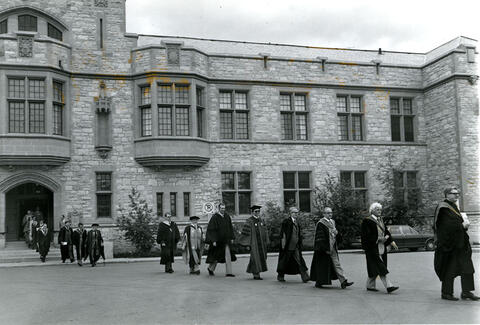
Title and statement of responsibility area
Title proper
Learned Societies Conference - Convocation - Academic Procession
General material designation
- Graphic material
Parallel title
Other title information
Title statements of responsibility
Title notes
Level of description
Item
Reference code
Edition area
Edition statement
Edition statement of responsibility
Class of material specific details area
Statement of scale (cartographic)
Statement of projection (cartographic)
Statement of coordinates (cartographic)
Statement of scale (architectural)
Issuing jurisdiction and denomination (philatelic)
Dates of creation area
Date(s)
-
2 June 1979 (Creation)
Physical description area
Physical description
1 photograph : b&w-drymounted ; 7.7 x 11.4 cm
Publisher's series area
Title proper of publisher's series
Parallel titles of publisher's series
Other title information of publisher's series
Statement of responsibility relating to publisher's series
Numbering within publisher's series
Note on publisher's series
Archival description area
Name of creator
Custodial history
Scope and content
Dignitaries parading from the Administration Building to the special convocation ceremonies in the Bowl during the Learned Societies Conference, U of S, 22 May-8 June 1979.
Bio/historical note: A special convocation was held 2 June 1979 to celebrate the "Learned Societies Conference". It was 20 years since the last conference was held at the University of Saskatchewan. Honourary Doctor of Literature (D.Litt.) degrees were conferred on four outstanding scholars: Jean Sutherland Boggs, Sir Moses I. Finley, Amartya Kumar Sen, and Arthur G.C. Whalley.
Bio/Historical Note: Learned Societies, a term applied in Canada to the large group of scholarly organizations that hold conferences annually from late May to mid-June at a different university location each year. Society members come not only to hear and discuss scholarly papers on the latest work in their fields, but also to renew contacts and share common concerns. The gathering of these associations in one place over one period is distinctively Canadian and owes more to practical evolution than to planning power. Selecting one site with suitable university accommodation was an answer to Canadian distance that allowed scholars more economical joint arrangements, let them attend meetings of societies besides their own, and encouraged them to visit varied geographical areas. The older Royal Society opened the way by moving from its Ottawa base to annual conferences at Montréal, Kingston or Toronto. Younger, more specialized associations - such as those in history, political science and economics - joined in, holding their own meetings along with, or just following, the senior scholarly society. By the 1930s the practice of holding an annual learned-conference period at a different site each year was well established, though such sites were usually in central Canada, where most larger universities were located. But in 1949 "the Learneds" went to Halifax, and soon afterwards to Winnipeg, Edmonton and Vancouver. In April 1996, the conference name was changed to the Congress of the Humanities and Social Sciences.
Notes area
Physical condition
Immediate source of acquisition
Arrangement
Language of material
Script of material
Location of originals
Availability of other formats
Restrictions on access
Terms governing use, reproduction, and publication
Photographer: Gibson
Copyright holder: University of Saskatchewan
Copyright holder - notes: Copyright transferred at time of donation 1992.
Copyright expires: 2029
Other terms: Responsibility regarding questions of copyright that may arise in the use of any images is assumed by the researcher.
Finding aids
Associated materials
Accruals
Location note
Vol. 77

